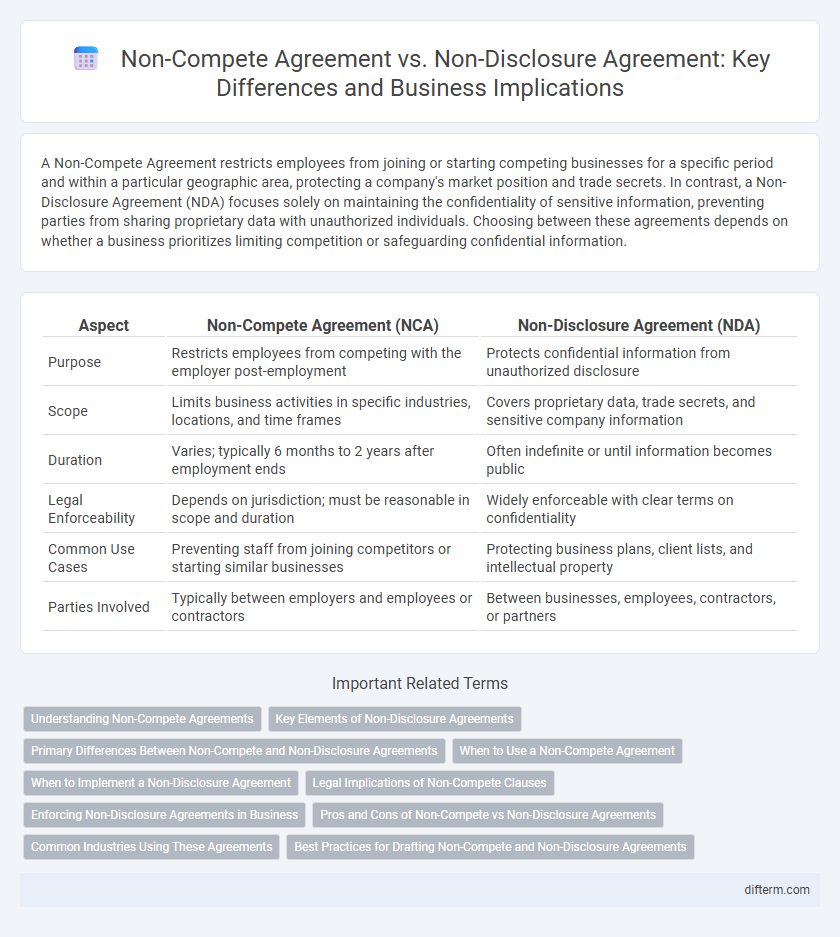A Non-Compete Agreement restricts employees from joining or starting competing businesses for a specific period and within a particular geographic area, protecting a company's market position and trade secrets. In contrast, a Non-Disclosure Agreement (NDA) focuses solely on maintaining the confidentiality of sensitive information, preventing parties from sharing proprietary data with unauthorized individuals. Choosing between these agreements depends on whether a business prioritizes limiting competition or safeguarding confidential information.
Table of Comparison
| Aspect | Non-Compete Agreement (NCA) | Non-Disclosure Agreement (NDA) |
|---|---|---|
| Purpose | Restricts employees from competing with the employer post-employment | Protects confidential information from unauthorized disclosure |
| Scope | Limits business activities in specific industries, locations, and time frames | Covers proprietary data, trade secrets, and sensitive company information |
| Duration | Varies; typically 6 months to 2 years after employment ends | Often indefinite or until information becomes public |
| Legal Enforceability | Depends on jurisdiction; must be reasonable in scope and duration | Widely enforceable with clear terms on confidentiality |
| Common Use Cases | Preventing staff from joining competitors or starting similar businesses | Protecting business plans, client lists, and intellectual property |
| Parties Involved | Typically between employers and employees or contractors | Between businesses, employees, contractors, or partners |
Understanding Non-Compete Agreements
Non-compete agreements restrict employees from joining or starting competing businesses for a specific period and geographic area after leaving an employer, protecting trade secrets and client relationships. These contracts are essential in industries where proprietary information and client loyalty provide a competitive advantage. Understanding the enforceability and limitations of non-compete agreements ensures businesses safeguard their interests without violating labor laws.
Key Elements of Non-Disclosure Agreements
Non-Disclosure Agreements (NDAs) are critical in business for protecting sensitive information such as trade secrets, proprietary data, and client details from unauthorized disclosure. Key elements include clear definitions of confidential information, obligations of the receiving party to maintain secrecy, duration of confidentiality, and specific exclusions to the agreement. Unlike Non-Compete Agreements, NDAs primarily focus on information protection without restricting a party's ability to work within the same industry.
Primary Differences Between Non-Compete and Non-Disclosure Agreements
Non-Compete Agreements restrict employees from working with competitors or starting similar businesses within a specific geographic area and time frame, aiming to protect competitive advantage. Non-Disclosure Agreements (NDAs) focus on safeguarding confidential information by legally preventing the sharing or misuse of proprietary data, trade secrets, or sensitive business details. The key distinction lies in their scope: Non-Compete limits post-employment activities, while NDAs control information sharing regardless of employment status.
When to Use a Non-Compete Agreement
A Non-Compete Agreement is essential when a business aims to protect its competitive advantage by restricting former employees from joining or starting rival companies within a specific geographic area and timeframe. It is most effective in industries where trade secrets, client relationships, and proprietary knowledge constitute critical business assets. Employing a Non-Compete Agreement helps prevent market share erosion and preserves strategic business interests after employee departure.
When to Implement a Non-Disclosure Agreement
A Non-Disclosure Agreement (NDA) should be implemented when businesses need to protect sensitive information such as trade secrets, proprietary data, or client lists during negotiations or collaborative projects. Unlike Non-Compete Agreements, NDAs safeguard confidential information without restricting an individual's future employment opportunities. Employing NDAs is essential during partnerships, investor discussions, or employee onboarding to legally prevent unauthorized disclosure and maintain competitive advantage.
Legal Implications of Non-Compete Clauses
Non-compete clauses restrict employees from joining or starting competing businesses for a specified period after leaving a company, potentially limiting future employment opportunities and impacting career mobility. Courts often scrutinize these clauses for reasonableness in scope, duration, and geographic area to ensure they do not unduly hinder competition or employee rights. Enforceability varies by jurisdiction, with some states imposing strict limitations or outright bans to protect workforce freedom and encourage innovation.
Enforcing Non-Disclosure Agreements in Business
Enforcing Non-Disclosure Agreements (NDAs) in business involves protecting sensitive information by legally binding parties to confidentiality obligations that prevent unauthorized disclosure or use of proprietary data. Courts typically require clear evidence of a breach, specificity in the agreement's scope, and demonstrable harm to uphold NDAs. Businesses should draft thorough NDAs tailored to their trade secrets and intellectual property to maximize enforceability and safeguard competitive advantages.
Pros and Cons of Non-Compete vs Non-Disclosure Agreements
Non-Compete Agreements limit an employee's ability to join competitors post-employment, protecting trade secrets but potentially restricting career mobility and causing legal disputes due to enforceability issues. Non-Disclosure Agreements primarily safeguard confidential information without restricting future employment, offering flexibility but providing less protection against competitive threats. Businesses must weigh Non-Compete's stronger competitive safeguards against the broader, more adaptable confidentiality protection of Non-Disclosure Agreements.
Common Industries Using These Agreements
Non-compete agreements and non-disclosure agreements are widely utilized across technology, healthcare, finance, and manufacturing industries to protect proprietary information and maintain competitive advantage. Tech companies often rely on non-disclosure agreements to safeguard software source code and trade secrets, while non-compete agreements are prevalent in healthcare to prevent staff from joining competitors. Financial institutions use both agreements strategically to secure confidential client data and restrict talent migration within the sector.
Best Practices for Drafting Non-Compete and Non-Disclosure Agreements
Effective drafting of Non-Compete and Non-Disclosure Agreements requires clear definitions of restricted activities and confidential information to ensure enforceability and legal compliance. Tailoring the duration, scope, and geographic limitations of non-compete clauses to be reasonable protects business interests without overburdening employees. Incorporating precise confidentiality provisions with specific examples of proprietary data enhances protection against unauthorized disclosure while maintaining practicality for both parties.
Non-Compete Agreement vs Non-Disclosure Agreement Infographic

 difterm.com
difterm.com